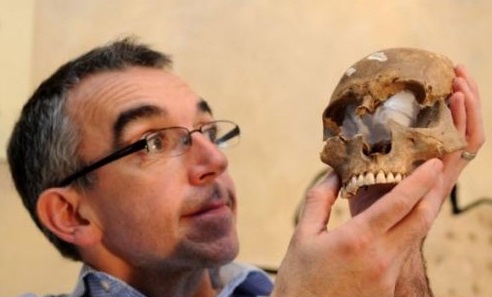(单词翻译:单击)
Horns Are Growing on Human Skulls Because of Phone Use
年轻人头骨长角与过度使用手机相关
It’s no secret that your cell phone can disrupt your health. But here’s a potential risk of cell phone use you may not have seen coming: A new study suggests our skeletons are adapting to our handheld device obsession.
众所周知,手机不利于人体健康。但或许你并不知道,使用手机存在这一潜在风险:一项新研究表明,我们的头骨正在适应我们对这一手持设备的痴迷。
How so? By helping us adjust to a position that most of us who are constantly checking our emails are familiar with: phone in hand, head bent down.
怎么会呢?因为头骨正在适应我们不时查看邮件的姿势:低头玩手机。
Researchers from Australia say cell phones might be the reason young adults are developing “enlarged external occipital protuberance” (EEOP). The occipital bone is at the lower part of the skull. What the scientists are saying is that our bodies are adjusting to worsening posture by growing a spike at the base of our skulls to relieve pressure induced by hours spent hunched over our phones.
澳大利亚的研究员表示,手机可能是导致年轻人患“扩大的外枕部突起”(EEOP)的原因。枕骨位于头颅骨的后部分。科学家表示,我们的身体正在适应错误的姿势,所以头骨底部长出了尖刺以缓解长时间低头看手机对头骨造成的压力。
Researchers wanted to know how prevalent this adaptation may be. Overall, 33% of the 1,200 men and women, ages 18 to 86, in the study exhibited EEOP. The researchers’ conclusions were published in the journal Scientific Reports.
研究员想了解这种适应的普遍程度。总体而言,在研究涉及的1200位18至86岁的受试者中,33%的受试者呈现扩大的外枕部突起。研究员的结论已发表在《科学报告》杂志上。
The new report cites previously published survey results in a population of Canadian university students, faculty, and staff. The survey found that participants spend an average of 4.65 hours a day on a hand-held device. Sixty-eight percent of participating students reported having neck pain.
这篇报告引用了已发表的关于加拿大大学生和教职工的研究数据。研究发现:这些受试者平均每天玩手机4.65小时。68%的受试学生称脖子疼。

“We hypothesize that the use of modern technologies and hand-held devices may be primarily responsible for these postures and subsequent development of adaptive cranial features in our sample,” the researchers wrote.
“我们猜想,使用现代技术和手持设备可能是受试者呈现此姿势以及后续适应性颅骨特征的主要原因,”研究员写道。
They emphasize that the high prevalence of EEOP among young people might not be good news for the ways our skeletal and muscular systems (together called “musculoskeletal”) work. “Our findings raise a concern about the future musculoskeletal health of the young adult population and reinforce the need for prevention intervention through posture education,” the report says.
他们强调,越来越多的年轻人患扩大的外枕部突起,这可能不利于骨骼和肌肉系统(合称为“肌肉骨骼”)的正常运转。我们的研究结果引起了大家对年轻人未来肌肉骨骼健康的关注,并强调通过姿势教育进行预防的必要性。
The authors caution that poor health and disability due to musculoskeletal disorders impose “increasing physical, social and financial burdens on individuals and societies.” They don’t say, however, what specific preventative measures should be put into place.
作者警告称,肌肉骨骼疾病导致的不健康和残疾问题会“增加个人及社会的生理、社会和经济压力。”然而,研究员并未说明,应采取哪些具体的预防措施。
译文属可可原创,仅供学习交流使用,未经许可请勿转载


